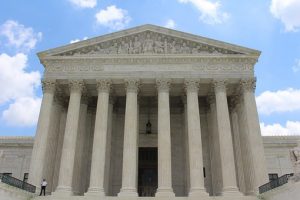New Case on Teacher Arbitration from New Jersey Supreme Court
 In the case of Bound Brook Board of Education v. Ciripompa, the Supreme Court reviewed the extreme deference which courts are required to give arbitrator’s decisions. However, the Supreme Court explained that this deference to the arbitrator is not unlimited.
In the case of Bound Brook Board of Education v. Ciripompa, the Supreme Court reviewed the extreme deference which courts are required to give arbitrator’s decisions. However, the Supreme Court explained that this deference to the arbitrator is not unlimited.
In the Bound Brook case, two tenure charges were filed against a teacher. The teacher, who had tenure, had allegedly been engaging in pervasive misuse of his employer-issued computer and inappropriate conduct toward female coworkers, allegedly often in the presence of or involving students. After an investigation, the Board determined that the teacher should be fired and tenure charges were filed against the teacher.
The first count of the tenure charges was “conduct unbecoming.” The second count was not labeled, but contained allegations of inappropriate conduct and harassing behavior toward coworkers, some of a sexual nature, and occasionally involving students. Like the local board of education, the New Jersey Commissioner of Education likewise found dismissal warranted and submitted the charges for review by an arbitrator pursuant to the TEACHNJ Act.
 New Jersey Lawyers Blog
New Jersey Lawyers Blog


 Our employment attorneys represent New Jersey public sector employees in disputes with their governmental employers. One area in which we frequently see disputes is the failure to give a “Rice Notice” to employees whose employment may be affected by an action by their governmental employers.
Our employment attorneys represent New Jersey public sector employees in disputes with their governmental employers. One area in which we frequently see disputes is the failure to give a “Rice Notice” to employees whose employment may be affected by an action by their governmental employers. In New Jersey, certifications are generally required for all professional staff members in public schools and other institutions regulated by the New Jersey Department of Education. There are various types of certificates based on the type of employment you are seeking (i.e., teachers, principals, school psychologist, etc).
In New Jersey, certifications are generally required for all professional staff members in public schools and other institutions regulated by the New Jersey Department of Education. There are various types of certificates based on the type of employment you are seeking (i.e., teachers, principals, school psychologist, etc). A problem our employment attorneys frequently encounter is complaints of nepotism in the hiring and promotion of public school teachers. While the hiring of relatives is not per se illegal in New Jersey public schools, there are significant restrictions on it.
A problem our employment attorneys frequently encounter is complaints of nepotism in the hiring and promotion of public school teachers. While the hiring of relatives is not per se illegal in New Jersey public schools, there are significant restrictions on it. The financial burden of a civil service appeal discourages many employees from filing. However, a successful employee may be able to recover the attorneys fees she spent on the appeal. Our attorneys handle civil service appeals for all of New Jersey’s Public Employees, such as police officers, teachers, firefighters, and administrative persons. Because we are concerned about the impact on our clients’ pocketbooks, we are always looking to see if we can shift the financial burden to the public employer.
The financial burden of a civil service appeal discourages many employees from filing. However, a successful employee may be able to recover the attorneys fees she spent on the appeal. Our attorneys handle civil service appeals for all of New Jersey’s Public Employees, such as police officers, teachers, firefighters, and administrative persons. Because we are concerned about the impact on our clients’ pocketbooks, we are always looking to see if we can shift the financial burden to the public employer. Our employment attorneys represent New Jersey Civil Service employees in appeals of disciplinary action. Recently, New Jersey’s Supreme Court had the opportunity to clarify some of the circumstances in which a government employee can obtain a waiver of the rule that he forfeit his job when convicted of a criminal offense.
Our employment attorneys represent New Jersey Civil Service employees in appeals of disciplinary action. Recently, New Jersey’s Supreme Court had the opportunity to clarify some of the circumstances in which a government employee can obtain a waiver of the rule that he forfeit his job when convicted of a criminal offense. One of the prime methods of hiring, firing, promotion and discipline of public employees is New Jersey’s civil service. Attorneys from our firm represent employees in appeals from actions by their civil service employers. One of the most significant issues in the civil service hiring process our employment attorneys have encountered is when government employers exercise the “Rule of Three.”
One of the prime methods of hiring, firing, promotion and discipline of public employees is New Jersey’s civil service. Attorneys from our firm represent employees in appeals from actions by their civil service employers. One of the most significant issues in the civil service hiring process our employment attorneys have encountered is when government employers exercise the “Rule of Three.” Background: New Regulations Adopted
Background: New Regulations Adopted The Fair Labor Standards Act (“FLSA”) is a federal statute enacted in 1938 with the goal of setting national standards for employees, including minimum wage, overtime requirements, child labor restrictions, and other protections. Our employment attorneys represent management and employers in litigation under FLSA violations and litigation about its state counterpart, the New Jersey Wage and Hour law. Our
The Fair Labor Standards Act (“FLSA”) is a federal statute enacted in 1938 with the goal of setting national standards for employees, including minimum wage, overtime requirements, child labor restrictions, and other protections. Our employment attorneys represent management and employers in litigation under FLSA violations and litigation about its state counterpart, the New Jersey Wage and Hour law. Our